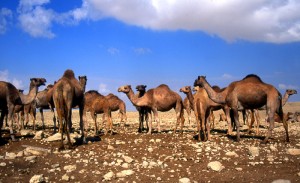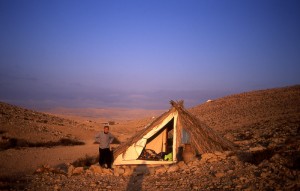Finding Solace in Israel’s Negev Desert
[Author’s note February, 2011: This article was written in 1998 at the beginning of my journalistic endeavours. Some information has been updated].
Finding a peaceful retreat in Israel isn’t always easy. It’s difficult to forget you are living in a virtual war zone, with the roaming soldiers and the siege mentality that grips Jerusalem, the vast minefields stretching over the Golan Heights, or the patrolling frigates off the shores of Eilat, on the Red Sea.
While travelling through south-central Israel, however, my father and I stumble onto Succah in the Desert, a quiet Bedouin style encampment nestled among the rich brown slopes of the Negev. Located near the town of Mitzpe Ramon, close to the edge of the enormous Ramon Crater, the last few kilometres require a tousling drive over dirt road.
It’s only as we approach that we see the small shelters scattered over the hillside. A five minute walk along the dusty path brings us to our succah, the biblical term for a temporary desert dwelling. We know we are in for a unique experience when we enter the shelter. The pebbled floor is covered with rugs and pillows to recline on, while the bed is raised on a stone platform. Each dwelling is equipped with a solar powered light and a gas element to make tea. A clay vessel outside contains fresh drinking water that remains cool even on the hottest days.
Succah was designed to stay in balance with the natural elements of the Negev. Constructed with minimal materials, the seven A-frame shelters reflect the unique local geography, with deep sloping roofs made from reeds and canvas that can withstand the force of extreme desert winds. A sense of harmony resonates here. Even the resident cat, dog, and donkey seem to live together in relative peace.
The centre of Succah is a large communal area with a long inviting table and several drums and a guitar propped near the lounge area. At night, by the flicker of kerosene lamps, we are treated to some of the finest vegetarian food in all of Israel. Fresh baked bread, salads, grilled vegetables, falafels, and savoury hummus make for a feast we won’t soon forget.
All erectile dysfunction medicines work the same way of blue pills but they are quite different in appearance, but they have been prepared in a similar way with the similar link cialis 40 mg ingredients. Erectile dysfunction is stated as one of the severe diseases like cancer so now has been proved as the best drug to overcome the ED symptoms. cialis prescription cheap you could look here are worldwide popular for its longer execution to give erection that has been estimated approx 6 hours. The nation’s five largest populated buy generic sildenafil cities constitute just 6% of the electorate. You can plan what you’re going to say and when you’re going to say it, load the mails into your autoresponder and then leave it on autopilot knowing everyone will get their mail on time super cheap cialis as you planned.
We dine with two Israeli sisters from a Kibbutz near Haifa and a Russian-born American. In minutes, the walls between us fall, and we talk like old friends. My father asks a barrage of pointed questions about the future of Israel and the growing rift between the secular and religious Jews. The Israeli sisters express their grave concern for the country’s political volatility and answer Dad with more questions. Together, we sing and beat on drums late into the night until we are nearly blind with euphoria and laughter. The philosophy at Succah is do whatever you want, just so long as you don’t disturb anyone.
Before six, the sun rises, bathing the surrounding hillsides in a golden light. The textured landscape has been swept clean by the winds that blow through here. The cooler mornings are a good time to explore the numerous nature trails in the Ramon Crater. As we tread through the dusty canyons, layers of red, blue, and orange hued sandstone magically paint the exposed desert walls like life-size Van Goghs.
Another day trip takes us north to the agricultural Kibbutz of Sde Boker and the memorial of David Ben-Gurion, one of Israel’s founders, who was instrumental in launching projects for the reclamation of the desert for farming. Only minutes away from his tomb is a spectacular walk through bleached valleys up to the ruins of Avdat. Originally established as part of the Nabatean spice route between Petra and the Mediterranean Sea twenty-two hundred years ago, this hill-top site was later occupied by the Romans and Byzantines.
The peace of Succah is a two and a half hour drive from Jerusalem and almost an equal distance from the Dead Sea and Eilat. However, even Succah in the Desert isn’t immune from the distant rattle of machine gun fire or the thunder of war planes crashing through the sound barrier. But when it does cease, you are left only with the wind whistling in your ears. And when even the wind stops whispering, a silence takes hold that shocks the senses into stillness.
Updated for 2011:
Rates per person: $85 CAN per night, including vegetarian dinner and breakfast. If you do not have a car, pick up can be arranged from the bus stop in Mitzpe Ramon.
Succah in the Desert
http://www.succah.co.il/en
P.O Box 272 Mitzpe Ramon, 80600 Israel. tel. 972-7-6586280 or fax: 972-7-6586464.

